Holy Day today: "On the Origin of Species" published; Spinoza born. 今日大日子!《物種起源》出版;史賓諾沙出生25/11/2009 The day is November 24, 2009. From the HUUmanists email list: Remember that today is a holy day to Humanists, Unitarian Universalists, and all others who hold sacred our rapidly increasing knowledge of our own precious human nature, and especially its relation to the rest of the universe. One hundred fifty years ago today, on November 24, 1859, Charles Darwin opened the gates of heaven with his publication of "On the Origin of Species by Natural Selection, or the Preservation of Favoured Races in the Struggle for Life," and suddenly a great light shone down upon us all. Our understanding of ourselves has grown rapidly ever since, is growing today, and will continue to grow forever. Humanity will never be the same again. David Schafer Amen and hallelujah! Phil Spinoza was born on this day in 1632. Happy Birthday to you, Spinoza. Another reason for a Humanist celebration. Gordon Gamm 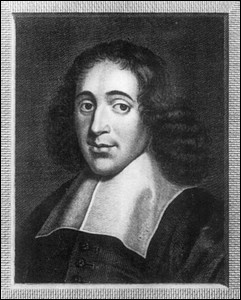 Spinoza is best known for his Ethics, a monumental work that presents an ethical vision unfolding out of a monistic metaphysics in which God and Nature are identified. God is no longer the transcendent creator of the universe who rules it via providence, but Nature itself, understood as an infinite, necessary, and fully deterministic system of which humans are a part. Humans find happiness only through a rational understanding of this system and their place within it. www.iep.utm.edu/spinoza 今日大日子!《物種起源》出版;史賓諾沙出生
十一月廿四日是大日子! UU人文主義電郵列表有人寫道: 今天是所有認為人類知識增長是神聖的人的聖日。一百五十年前的今天,達爾文出版《物種起源》,為人類打開天堂之門,知識的大光突然普照世人。自此,人類對自己的認識突飛猛進;人類從此不再一樣。 阿門!哈利路亞! 史賓諾沙於一六三二年的今天出生。生日快樂,史賓諾沙。這是另一件值得人文主義者慶賀的事件。 (史賓諾沙提出一元論,即神與自然原為一。神不再是一超越者,創造並保守宇宙,而是自然本身,無限而必然,而人是其中的一份子。)
0 Comments
King's God: The Unknown Faith of Dr Martin Luther King Jr by Robert James "Be" Scofield Nov/Dec 2009 Tikkun Although Martin Luther King served as a Baptist minister, this article from Tikkun shows that, as a young man in the liberal Crozer Theological Seminary (1948-1951), King rejected majority of the orthodox Christian doctrines, most central of which is perhaps the deity of Jesus. In The Humanity and Divinity of Jesus, a paper written for the class "Christian Theology Today," King clearly lays out his non-orthodox view on the deity of Jesus: "The significance of the divinity of Christ lies in the fact that his achievement is prophetic and promissory for every other true son of man who is willing to submit his will to the will and spirit of God. Christ was to be only the prototype of one among many brothers. The appearance of such a person, more divine and more human than any other, and in closest unity at once with God and man, is the most significant and hopeful event in human history. This divine quality or this unity with God was not something thrust upon Jesus from above, but it was a definite achievement through the process of moral struggle and self-abnegation." A few more King's liberal views on core Christian doctrines: Virgin Birth. King is frank here: "We of this scientific age will not explain the birth of Jesus in such unscientific terms." Jesus's early disciples saw his "spiritual life so far beyond theirs," explains King, that they believed that Jesus's uniquesness could only be explained biologically. Bodily Resurrection. Jesus's followers "had been captivated by the magnetic power of his personality," King writes, which led them to believe that he "could never die." Second Coming. "It is obvious that most twentieth century Christians must frankly and flatly reject any view of a physical return of Christ," says King boldly. "The final doctrine of the Second Coming is that whenever we turn our lives to the highest and best there for us is the Christ." Regarding heaven, King understands that it is located here on earth: "When we see social relationships controlled everywhere by the principles which Jesus illustrated in life--trust, love, mercy, and altruism--then we shall know that the kingdom of God is here." The author, therefore, concludes: "It should not be surprising then that while Dr King served a Baptist church, his first choice of religion was Unitarian Christian (which later merged with Universalism). Coretta Scott had been attending Unitarian churches for years before she met and married Martin, and they both attended Unitarian services while in Boston." 馬丁路德金的神:馬丁路德金的信仰鮮為人知的一面 眾所週知,馬丁路德金是浸信會牧師。但這篇在 Tikkun 刊登的文章說,從他在神學院時的學術論文顯示,年青時的馬丁路德金拒絕了很多正統的神學觀點,當中最核心的要數耶穌的神聖。以下的論文文字清楚解釋他對耶穌神聖的非傳統觀點: 「基督的神聖的意義在於,他的成就,對每個願意服從上帝意志的真正人子,具先導作用。基督只是在眾多兄弟中的一個原型。出現這樣一個比所有人都更神聖和更人性,同時與上帝和人聯合的人物,在人類歷史上是最重要和最充滿希望的事件。耶穌的神聖素質或與神合一,不是從上而下強加的本質,而是透過道德掙紮與自我克制過程而獲得的成就。」 馬丁路德金還有其他自由神學的思想: 童女產子。他說得清楚:「我們這科學時代不再如此非科學地解釋耶穌之出生。」他認為耶穌的門徒經驗耶穌之「靈性遠超凡人」,所以相信唯有與別不同之純潔成孕才能解釋耶穌的獨特性。 身體復活。馬丁路德金如此寫道:耶穌的跟隨者「完全臣服於他的人格力量」,至使他們相信耶穌「不可能死」。 基督再來。他大膽宣稱:「很明顯,大多數二十世紀的基督徒必須坦率地斷然拒絕任何基督身體將再來的想法。」他解釋:「基督再來這教義的意思是,每當我們的生命向最高處邁進,基督便向我們再來。」 至於天堂,他主張地上的:「當我們看到世界各地的社會關係彰顯耶穌在生命中示範的原則—信任、愛、憐憫、利他主義—那麼我們就知道,神國在這裡。」 所以,本文作者如此寫道:「這樣,我們便無需驚訝,雖然金博士在浸信會事奉,他的宗教首選是 Unitarian 基督教(它後來與 Universalism 合併)。他的夫人在認識馬丁之前,多年來都是上 Unitarian 教會的;他倆在波士頓的時候,都是參與 Unitarian 的主日崇拜的。」
Carl Sagan's book "The Varieties of Scientific Experience" (New York: Penguin, 2006) explains very well what Religious Naturalism is, although Carl has not identified himself or his religious view with this term. Religious Naturalism approaches religion and spirituality by the way of science. The words of Ann Druyan, Carl's wife and editor of the book, in "Editor's Introduction," are remarkably in-line with this position:
For Carl, Darwin's insight that life evolved over the eons through natural selection was not just better science than Genesis, it also afforded a deeper, more satisfying spiritual experience. (p. x) He believed that the little we do know about nature suggests that we know even less about God. We had only just managed to get an inkling of the grandeur ofthe cosmos and its exquisite laws that guide the evolution of trillions if not infinite numbers of worlds. The newly acquired vision made the God who created the World seem hopelessly local and dated, bound to transparently human misconceptions and conceipts of the past. (p. x) ...he never understand why anyone wound want to separate science, which is just a way of searching for what is true, from what we hold sacred, which are those truths that inspire love and awe. (p. xi) His argument was not with God but with those who believed that our understanding of the sacred had been completed. Science's premanently revolutionary conviction that the search for truth never ends seemed to him the only approach with sufficient humility to be worthy of the universe that it revealed. The methodology of science, with tis error-correcting mechanism for keeping us honest in spite of our chronic tendencies to project, to misunderstand, to deceive ourselves and others, seemed to him the height of spiritual discipline. If you are searching for sacred knowledge and not just a palliative for your fears, then you will train yourself to be a good skeptic. (p. xi) The idea that the scientific method should be applied to the deepest of questions is frequently decried as "scientism." This charge is made by those who hold that religious beliefs whould be off-limits to scientific scrutiny---that beliefs (convictions without evidence that can be tested) are a sufficient way of knowing. Carl understood this feeling, but he insisted with Bertrand Russell that "what is wanted is not the will to believe, but the desire to find out, which is the exact opposite." (p. xi) Until about five hundred years ago, there had been no such wall separating science and religion. Back then they were one and the same. It was only when a group of religious men who wished "to read God's mind" realized that science would be the most powerful means to do so that a wall was needed. These men---among them Galileo, Kepler, Newton, and, much later, Darwin---began to articulate and internalize the scientific method. Science took off for stars, and institutional religion, choosing to deny the new revelations, could do little more than build a protective wall around itself. (p. xi) To him we were "starstuff pondering the stars; organized assemblages of 10 billion billion billion atoms considering the evolution of atoms; tracing the long journey by which, here at least, consciousness arose." For him science was, in part, a kind of "informed worship." (p. xiii) (This is a Chinese post at the forum of the Hong Kong positivistic philosopher Lee Tin Ming. This excerpt from an article by Erich Fromm says that religions can be divided into totalitarian religions and humanistic religions. The God of the Old Testament is totalitarian. The original teachings of Jesus were humanistic, but Roman rulers later turned them into a totalitarian Christianity. This article is very inspiring. 在《李天命網上思考》,有人貼了這篇文章,甚具啟發性。)
獨裁宗教與人本宗教 (Totalitarian Religions and Humanistic Religions) Psychoanalysis & Religion By Erich Fromm http://leetm.mingpao.com/cfm/Forum3.cfm?CategoryID=2&TopicID=4359&TopicOrder=Desc&TopicPage=1 獨裁宗教的基本要點是屈服於一種超人的力量,其主要德性是服從,不服從是最大的罪過。…相反,人本宗教則以人的力量為中心,人必須為了理解他自已,與他人的關係以及他在宇宙中的地位而發展他的理性力量。… 獨裁宗教和人本宗教的區分不僅貫穿於各種宗教,還存在於同一宗教之內。… 舊約的開頭是用獨裁宗教寫的,上帝是一個家族的絕對統治者的形象,他可以隨心所欲地創造人和毀滅人。他禁止人類吃智慧樹上的果子,並威脅說如果人類違反禁令,難逃一死。…當亞伯拉罕為所多瑪祈求,上帝和人之間開始了新的關係。他批評上帝違反他自已的原則:「將義人和惡人同殺,將義人和惡人看待,這斷不是你所行的,審判大地的主,豈不行公義嗎?」。 亞當吃禁果而墮落的故事與亞伯拉罕的爭辯之間的差異是很明顯的。前一個故事中,人被禁止明白善惡,他與上帝是屈從的關係。而後一個故事裡,人運用他的善惡知識,以正義之名批評上帝,上帝也不得不讓步。… 早期的基督教是人本主義的,不是獨裁主義的,這可從耶穌的教導的內容和精神為證。耶穌說:「天國在你們心裡」,這是非權威主義思想簡單而清晰的表達。但後來,基督教不再是窮苦百姓的宗教,開始變成羅馬統治者的宗教。於是,基督教中的獨裁主義便佔優勢了。… 在人本主義宗教中,上帝是人更高的自我形象,是人潛在的或應該成為的形象的象徵,而在獨裁主義宗教中,上帝是人的原始性質——他是理性的愛的惟一擁有者,上帝越完美,則人越不完美。人把自已身上最好的東西賦予了上帝,從而使人自已變得赤貧。既然上帝具備了全部的愛、知慧和正義,那麼人就被剝奪了這些品質,變得空虛和不幸。他從渺小感開始,進而變得徹底的無能為力,他們把全部力量賦予上帝了。這種賦予的手法,我們可在人與人之間的受虐的、服從的性格關係中觀察到,一個人敬畏另一個人,因而把他的力量和希望寄托於那人身上。正是同樣的手法,使人賦予獨裁領導者以卓越的知慧和善良的品質。 當人把他最有價值的力量賦予上帝,他和他自已的力量是甚麼關係呢?它們開始和他分離,異化自身。每一件他曾具有的東西,現在都歸於上帝了,他變得一無所有。他只有通過上帝才能接近他自已。在崇拜上帝的過程中,他試圖與那部分在賦予中失落的自我相關係。在把他所有的東西給了上帝後,他又向上帝乞求歸還一些本來是他的東西。但由於喪失了他自已,他完全處於上帝的掌握之中。他必然感到像一個罪人,因為他剝奪了自已所有的善良,只有通過上帝的仁慈和榮耀,他才重新獲得使他成為人的東西。當他與自我分離時,為了讓上帝給他一些愛,他必須證明自已多麼缺乏愛,為了讓上帝用超人的知慧指導他,他必須證明自已多麼缺乏知慧。 |
Categories
All
Archives
February 2022
AuthorAlex from UUHK |
||||||||||||||||||||||||||||||
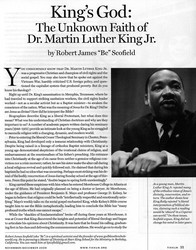
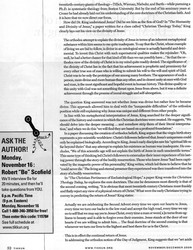
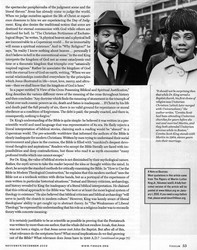
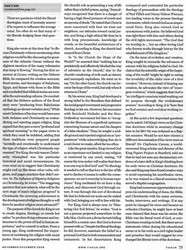

 RSS Feed
RSS Feed
